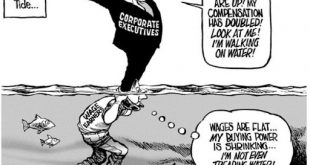Here is to another crisis like this one! Paper co-authored with Esteban Pérez that was a Levy Institute working paper is published. From the abstract: The Spanish crisis is generally portrayed as resulting from excessive spending by households associated to a housing bubble and/or an excessive welfare spending beyond the economic possibilities of the country. We put forward a different hypothesis. We argue that the Spanish crisis resulted, in the main, from a widening deficit position...
Read More »Corporate Debt in Latin America and its Macroeconomic Implications
New paper by Esteban Pérez and co-authors published by the Levy Institute. From the abstract: This paper provides an empirical analysis of nonfinancial corporate debt in six large Latin American countries (Argentina, Brazil, Chile, Colombia, Mexico, and Peru), distinguishing between bond-issuing and non-bond-issuing firms, and assessing the debt’s macroeconomic implications. The paper uses a sample of 2,241 firms listed on the stock markets of their respective countries, comprising 34...
Read More »Monitoring the evolution of Latin American economies using a flow-of-funds framework
New paper by Esteban Pérez. From the abstract: Flow-of-funds accounting permit to monitor the financial sector in terms of flows and stocks and to analyze its relationship with the real sector. These show inter-sectoral financial flows, capture balance sheet positions and all financial transactions by instrument, type and economic sector. The construction of flow-of-funds accounts has been traditionally spearheaded by the central banks of developed nations including the Federal Reserve,...
Read More »“Wages, prices, and employment in a Keynesian long-run” by Marglin
New issue of ROKE with papers by Stephen Marglin, Amit Bhaduri, Esteban Pérez (with your truly) among others. Last issue of the several in honor of the 25 years of the Marglin-Bhaduri papers on profit-led/wag-led growth. From the abstract of Marglin's paper: The central question this paper addresses is the same one I explored in my joint work with Amit Bhaduri 25 years ago: under what circumstances are high wages good for employment? I extend our 1990 argument in three directions....
Read More »Prebisch and Central Banking
You can read here the Power Point of our presentation at History of Economics Society conference on Prebisch and Central Banking and his role as a Money Doctor in the 1940s after he left the Central Bank of Argentina.
Read More »Quantitative Easing (QE), changes in global liquidity and financial instability
New paper by Esteban Pérez. From the abstract: This paper argues that QE led to significant changes in the global financial system, which, are not conducive to greater financial stability. Through a policy of reserve accumulation, QE disconnected base money from the money supply and deposits from loans. Jointly with the deleveraging process of global banks, QE contributed to restrain the supply of bank credit growth throughout the world. Also global banks continued to expand their trading...
Read More »The end of neoliberalism?
[embedded content] Panel at the Eastern Economic Association Meeting with Robert Blecker, Orsola Costantini, Esteban Pérez Caldentey and Mark Weisbrot. The mini symposium organized by Orsola I discuss in the beginning is here, and the papers by Cornell West and Nancy Fraser are here and here, respectively.
Read More »Archives and the history of economic ideas
For the archives, of course As it maybe be painfully clear by now, posts will remain relatively sparse during the rest of the summer break. I recently attended the History of Economics Society (HES) meetings at Duke University, as I noted here. I attended less sessions that I would have liked, but it was enough to confirm the increasing emphasis that has been accorded to archival research. That is, probably, the result that now, slightly more than a 100 years since the...
Read More »A Post-Keynesian Interpretation of the Spanish Crisis
New paper with Esteban Pérez published by the Levy Economics Institute.From the abstract: The Spanish crisis is generally portrayed as resulting from excessive spending by households, associated with a housing bubble and/or excessive welfare spending beyond the economic possibilities of the country. We put forward a different hypothesis. We argue that the Spanish crisis resulted, in the main, from a widening deficit position in the nonfinancial corporate sector—the most important explanatory...
Read More »Thirlwall’s Law debate in Investigación Económica
The other side Jaime Ros, with Pedro Hugo Clavijo, wrote a critique of Thirlwall's Law (in Spanish). Replies by Carlos Ibarra here, Esteban Pérez here and myself here. Their rejoinder here. All in Spanish. Haven't read the whole rejoinder yet (just got it), but for some reason they insist that the supermultiplier implies that exports are always the main source of autonomous demand.* Hm, that's weird. Just puzzled by that one. They should read Bortis and Serrano (this one with Fabio...
Read More » Heterodox
Heterodox





